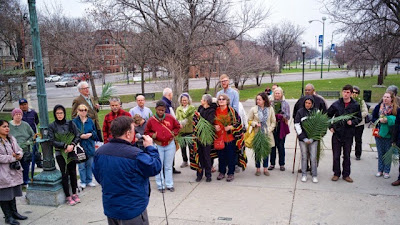I'm grateful to
Chicago Tribune columnist John Kass for his
column yesterday, in which he talked about Easter lamb and the meaning of Lent to him. (For those of you who don't live in Chicago or don't regularly read the
Chicago Tribune, it's important to understand that Kass is the very model of a hard-nosed city columnist -- the kind that doesn't pull any punches. Our previous mayor, Richard M. Daley, will forever be remembered by the Kass-conferred sobriquet "Richard Shortshanks.") Kass writes, "I've been wondering whether it's possible to make that [Lenten] journey while doing the work I love. Lent for many Christians involves prayer and fasting and concentrating on the spirit. But a journalist by definition is in the world, and going over a list of my columns of these past 40 days is like studying a road map, leading expressly away from where I'd been hoping to go." (See
A roasted lamb celebrates end of a hard journey)
 |
Palm Sunday at St. Luke's Logan Square.
(Tough guys wear crosses from Nicaragua
that have been resurrected from melted-
down aluminum engine blocks!) |
What I'm grateful to Kass for is the way this hard-nosed guy is really trying to get the words out. He doesn't want anyone to think he's gone soft, but lurking just beneath the surface of this column are the words we proclaimed yesterday at the church I attend in Logan Square:
Christ is risen!
He is risen indeed! Allelulia!
[CORRECTION from John Kass: "Thanks, but the words "Christos Anesti" weren't "lurking beneath the surface" of my column. They were WRITTEN in the column." Oops! So much for my Greek!]
"So, in gratitude to John Kass, and in keeping with what I perceive to be our shared desire to place our faith "in the world" and share the good news (while at the same time not turning people off with too much Jesus talk) -- in short, keeping my tough guy cred intact -- I herewith share some scenes from my Holy Week 2014.
Palm Sunday: "Hey! Save us!"
On Palm Sunday (April 13, 2014) the Logan Square Ecumenical Alliance (LSEA) hosted its 3rd annual public witness at the Logan Square monument from 12pm—1pm. As in previous years, we gathered to celebrate the very public and political nature of Jesus’ entry into Jerusalem and his call to people of faith to resist the values of empire and seek instead “the kingdom of heaven.” LSEA congregations processed from their respective houses of worship carrying palm branches, for an opportunity to stand together to listen to our neighbors and dream together about God’s preferred future for our community.
Building on the success of our December 2013 “Posada for Public Housing,” we focused on issues of housing in Logan Square as we heard testimony from people experiencing eviction and foreclosure and campaigning for quality, affordable public housing. We considered faithful responses to our neighbors' needs, and provided opportunities to get directly involved. (See
What do we want? SALVATION! When do we want it? NOW! )
My favorite is the vignette in the center of the picture above. How about a close-up?
Maundy Thursday at St. Luke's
Services at St. Luke's extended across the three days leading up to Easter, plus Easter itself.
On Maundy Thursday, we remembered Jesus' last supper with his disciples.
Some of us washed feet. Some of us had our feet washed. (Some of us played the guitar.)
It got us focused on the fact that what we do, we do in community.
Good Friday: "We who believe in freedom cannot rest!"
On Good Friday 2014 (April 18), I joined with members of ELCA congregations from
throughout the Chicago area, together with others, to participate in the
34th annual
8th Day Center Good Friday Justice Walk. The theme for the
walk was "We who believe in freedom cannot rest!" and this certainly
resonated with the work of the Metro Chicago Synod's Working Group on
the Middle East. (See
Palestine: The Women Weep (34th Annual 8th Day Good Friday Justice Walk)
In preparation for the day, Rev. Carla Powell prepared a special
devotion, and worked with a large team to create boards reproducing
protest art from the separation wall that surrounds the West Bank.
Check out also the witness of the
Chicago Coalition to Shut Down Guantanamo.
Easter Vigil
We held a full Easter Vigil at St. Luke's on Saturday. The vigil on Saturday is fast becoming the center of our Easter observance, even more important than the Sunday morning Easter service.
This year, my "portion" was the reading of the story of
Ezekiel and the Valley of Dry Bones -- complete with sound effects by percussionist (and seminarian) Chris Michaelis, and followed by the full choir (and congregation) singing "Dry Bones."
I wish that I had pictures to capture the feeling of that event -- especially Noel Spain's evocation of the life and trials of Pete Seeger, in connection with the Fiery Furnace story; and the full community gathering around the table for communion.
For background on the Easter vigil tradition, see the Wikipedia article on
Easter Vigil.
Easter: "I'm happy! ALLELULIA!"
Check out Pastor Erik Christensen's
sermon from Sunday at St. Luke's . . . AND . . .
. . .
this video footage of the joyful music yesterday at St. Luke's.
(As I heard one person in the pews say, "This is a place where you can really have some fun!")
Easter 2
In light of the fact that there is a community that gathers at St. Luke's on every Wednesday for
Community Dinner, and recognizing how much everybody enjoyed our Lenten
"Prayers Around the Cross" on Wednesday nights this year,
Easter will happen again all over again on Wednesday, April 23, at St. Luke's. JOIN US!
Related posts

Last year at this time, on Good Friday morning, I was not only getting ready to participate in the annual 8th Day Good Friday Justice Walk -- a venerable Chicago institution -- but also getting ready to put on a play. The playwright Jack Gilroy was in town to make a special appearance
together with a small group of us who were staging a reading of his play,
The Predator.
The Predator is a play that many communities have used to stir conversation about the nature of drone warfare. Jack is much on my mind today, in part because of the anniversary of that performance, but also because of news he recently shared with me about an upcoming court appearance.
(See
You're Gonna Put This Guy in Prison? Really??)
Martin Luther said, "In this way we
are all priests, as many of us as are Christians. There
are indeed priests whom we call ministers. They are chosen from among
us, and who do everything in our name. That is a priesthood which is
nothing else than the Ministry." See Wikipedia:
universal priesthood.) All of us? Really? How about all the many, many, many people pursuing all kinds of walks of life in a big city like Chicago?
(See
Get Outside Your Comfort Zone and Have A Conversation Today (Welcome to the Ministry))
An important part of spreading the good news, I believe, lies in
suggesting how it might be possible that this universal, un-grasp-able
power that we call "God" may actually find its expression in the midst
of our lives through plumb lines, flies, and prophets like Ron and
Occupy Chicago.
(See
Flies in the Ointment and Plumb Lines for Israel)

We busted out of our big Neo-Gothic church building on Sunday and gathered for worship on the Boulevard. (Or, to be more precise, beneath the trees on the median alongside Logan Boulevard in Chicago, during the weekend-long "Boulevard Fest" sponsored by our congregation.) I've decided to embrace this new feeling of exposure and try to learn some lessons. I put them under the rubric
"Congregations that worship in glass houses . . . (complete the sentence) . . . . "
(See
Congregations That Worship in Glass Houses . . . )




















































